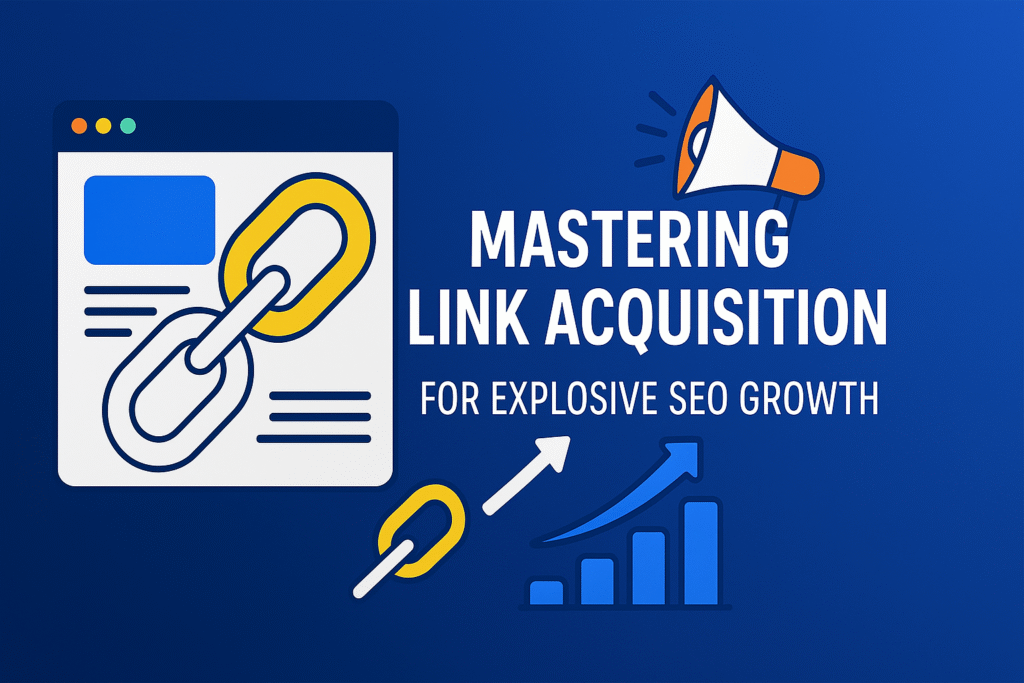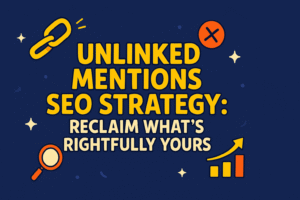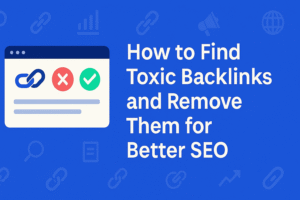
Let us talk about something that can truly change your SEO game. It is called link acquisition. Sounds a bit technical, right? But do not worry. We will keep it simple.
In this blog, you will learn what link acquisition is, why it is important, and how you can use it to grow your website traffic in a smart and effective way. Whether you are a beginner or someone with a bit of SEO knowledge, this guide will help you master the basics and go even further.
What Is Link Acquisition?
So, what is link acquisition exactly? It is the process of getting other websites to link back to yours. These links are called backlinks. And they matter a lot.
Why? Because when trusted sites link to your content, search engines see it as a vote of confidence. More quality links usually mean better rankings in search results.
Think of it like this: if many people point at your restaurant and say it is good, others are more likely to visit. The same idea works online with websites.
Why Link Acquisition Matters In 2025
Search engines are always changing. But one thing stays strong—links. They are still one of the top factors that help your website rank.
Here is why link acquisition is important now more than ever:
1. More competition online
Everyone wants attention. Links help you stand out by signaling that your content is valuable and trustworthy to search engines and users alike.
2. Trust and authority
When high-quality sites link to you, your site becomes more trustworthy. This trust boosts your visibility and makes your brand look more credible.
3. Traffic boost
Good backlinks can bring real people to your site. These visitors are often more engaged since they came through a trusted source.
In 2025, smart link acquisition is not optional. It is essential.
The SEO Power Of Link Acquisition
If you want your content to rank higher on Google, you need links. But not just any links—relevant and natural ones.
Here is how link acquisition helps your SEO:
1. Improves Search Engine Rankings
Search engines treat quality backlinks like votes. More relevant votes mean better rankings on search engine results pages.
2. Sends Referral Traffic To Your Site
A backlink from a popular site can drive their visitors to your page, bringing in targeted and interested traffic.
3. Helps Search Engines Discover Your Pages Faster
When a search engine crawls a linking page, it can follow the link to your content and index it quicker.
Simple idea, right? Yet many websites still ignore it or do it wrong.
Link Building Vs Link Acquisition
You might hear people say “link building” instead of “link acquisition.” Are they the same?
Not exactly.
- Link building often focuses on quantity—getting as many links as possible. This may lead to lower-quality backlinks that do not help much or may even harm SEO.
- Link acquisition focuses on quality—earning links that matter. It involves thoughtful strategies and building meaningful relationships for long-term SEO growth.
In 2025, quality wins every time. So, link acquisition is the smarter path.
Link Acquisition Strategy Breakdown
Time to dive into how you can actually get links. This is your link acquisition strategy roadmap. Not every tactic works for everyone, so choose what fits your goals and resources.
1. Guest Posting
Write helpful articles for other websites in your industry. In return, you get a link back to your site.
- Find sites that accept guest posts: Use search engines or tools to locate websites in your niche that welcome guest contributors.
- Pitch a unique topic: Send them an idea that fits their audience but also lets you naturally include your link.
- Include your link naturally in the content: Place your link where it adds value and fits within the context of the article.
2. Broken Link Building
Look for pages with dead links. Then, suggest your own content as a replacement.
- Use tools to find broken links: Platforms like Ahrefs or Check My Links can help spot dead links on relevant websites.
- Reach out with a helpful message: Be polite and offer your content as a way to fix their broken link.
- Offer your link as the fix: Ensure your page closely matches the content of the dead link for a better chance of success.
3. Niche Edits
These are links added to existing blog posts. The post already exists, but your link gets inserted where it makes sense.
- Find older articles on related topics: Use Google search or SEO tools to find aged but relevant articles.
- Suggest your link as a useful resource: Make sure your content complements the section where you want your link placed.
4. Resource Page Links
Some sites list useful tools or guides. You can get listed too.
- Search for pages like “Useful tools for marketers“: Use search terms like “top resources” plus your niche.
- Ask them to add your link: Contact the site owner and explain why your link adds value to their resource list.
5. Link Reclamation
Sometimes people mention your brand but forget to link. A polite email can fix that.
- Use tools to find unlinked brand mentions: Tools like Google Alerts help you find brand mentions with no link.
- Reach out and ask for the link: Kindly ask the author to add a link to your mentioned brand name.
6. HARO and PR
HARO stands for Help A Reporter Out. Journalists ask questions, and you can answer.
- Sign up for HARO: It is free and gives access to journalists looking for expert quotes.
- Provide useful insights: Give clear, valuable answers to questions within your expertise.
- Get mentioned in news articles with a backlink: If they use your quote, you often get a link to your site too.
Creating Link-Worthy Content
Link acquisition becomes easy when your content is actually helpful. No one wants to link to boring or thin content.
Here are a few ideas to create link-worthy content:
1. How-To Guides That Solve Problems
Step-by-step guides are always useful and have a high chance of earning links.
2. Original Research With Real Data:
If you publish unique stats, others will want to cite your work.
3. Free Tools Or Calculators
These resources offer practical value and get shared often.
4. Infographics That Explain Complex Ideas Simply
Visual content is easy to link to and adds clarity to dense topics.
Tools For Link Acquisition
You do not have to do it all manually. There are tools that can make your link acquisition efforts easier:
1. Ahrefs
Find backlink opportunities
See who links to your competitors and reach out to them with your content.
2. Hunter.io
Find email addresses for outreach
This helps you contact blog owners or editors directly.
3. BuzzStream
Manage your outreach campaigns
Keep your emails organized and follow up automatically.
4. Google Alerts
Track unlinked mentions
Get notified when someone mentions your brand without linking.
Link Acquisition For Different Goals
Your approach might change based on what kind of business you run. Let us look at a few examples:
1. Local SEO
- Get listed in local business directories
Submit your business info to sites like Yelp and Google Business Profile.
- Join local chambers of commerce
These often link to member businesses on their websites.
- Reach out to local blogs or newspapers
Offer stories or insights that might interest a local audience.
2. SAAS Companies
- Publish case studies or success stories
Show how your product helped real users achieve results.
- Get mentioned in software roundups
Reach out to blogs listing the best tools in your category.
- Partner with influencers in your niche
Let trusted people talk about your software and link to it.
3. Ecommerce Stores
- Reach out to product reviewers
Ask bloggers to try and review your product in exchange for honest feedback.
- Offer discounts to bloggers in return for honest reviews
This encourages content creation and links.
- Collaborate with affiliate marketers
They will link to your product pages to drive traffic and sales.
Measuring Link Acquisition Success
Getting links is great, but what matters more is what those links do for you. Measuring results helps you refine your approach and focus on what works best.
1. Domain authority of the site linking to you
A backlink from a high-authority domain carries more weight and can improve your site’s trust and visibility.
2. Referral traffic from the backlink
Monitor how many people click the link to visit your site. This shows how valuable and visible the link is.
3. Keyword rankings over time
Keep an eye on your target keywords. A rise in rankings often indicates the success of your link acquisition efforts.
Common Link Acquisition Mistakes
Some link tactics can backfire if done carelessly. Avoid these common mistakes that can hurt your SEO and waste your time.
1. Buying cheap links
Links from low-quality or spammy sites can lead to penalties. Always choose quality over quantity.
2. Overusing exact match anchors
Repeating the same keyword anchor looks unnatural. Mix in branded, partial, and generic anchors to stay safe.
3.Ignoring link relevance
A backlink from a random or unrelated site offers little value. Focus on industry-relevant sources for better results.
Stay cautious and always prioritize quality, context, and ethics in your link acquisition process.
Advanced Link Acquisition Tactics
Once you understand the basics, you can move on to more powerful tactics. These methods take more work but deliver better and more lasting SEO results.
1. Unlinked brand mentions
Look for online mentions of your brand that are not linked. Reach out and ask politely for a link to be added.
2. Reverse engineer competitors
Use tools to study where your competitors get their backlinks. Reach out to those same sites with better content.
3. Collaborate with experts
Co-write articles, run interviews, or host webinars with industry leaders. These often lead to natural and authoritative backlinks.
These approaches need time and effort, but the returns in traffic and rankings are well worth it.
The Future Of Link Acquisition
The SEO world is always changing. What works today might not work tomorrow.
Still, here is what looks promising for the future:
1. AI for smarter prospecting
Save time finding the right sites: AI tools can sort through thousands of sites to find ideal link opportunities.
2. More focus on relevance
Context will matter more than ever: A backlink from a relevant site will carry more weight than ever before.
3. Personalized outreach
Copy-paste emails will stop working: Tailored messages that speak directly to the recipient will get more responses.
Stay updated, keep testing, and never stop learning.
Final Thoughts
Link acquisition is not a trick or a shortcut. It is a long-term play that builds real value.
If you follow a clear strategy, focus on helpful content, and avoid shady tactics, your efforts will pay off. More traffic. Better rankings. And a stronger brand.
So go ahead. Start with one or two tactics. Stay consistent. And watch your site grow.
FAQs
Do I Need To Pay For Backlinks?
No, you should not. Paying for links can lead to penalties from Google. Focus on earning links through content, relationships, and real value.
How Long Does Link Acquisition Take To Show Results?
It takes time. Usually, you start seeing results in a few weeks to a few months. SEO is long-term, so patience and consistency are key.
Can I Use Social Media For Link Acquisition?
Yes. Sharing your content on platforms like Twitter, LinkedIn, or Facebook can help it get noticed by bloggers, journalists, and site owners who may link to it.
What Is A Niche Edit In Link Acquisition?
A niche edit is when your link is added into an existing article on another website. It is a quick and smart way to get relevant backlinks.
Can Bad Backlinks Hurt My Site?
Yes. Links from spammy or unrelated sites can lower your SEO performance. Regularly audit your backlinks and disavow the harmful ones if needed.


